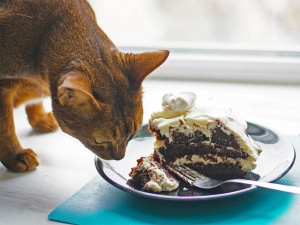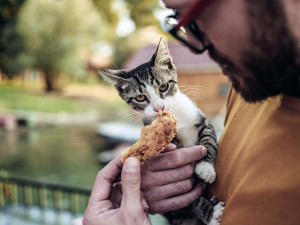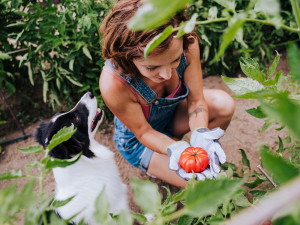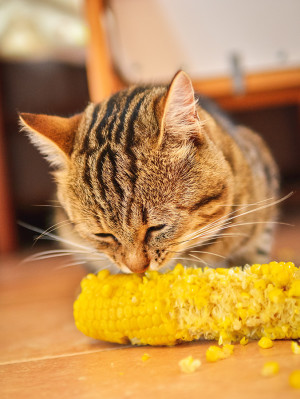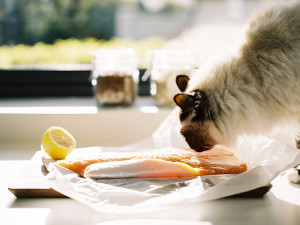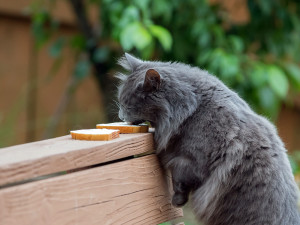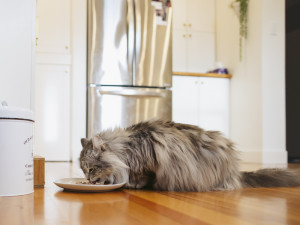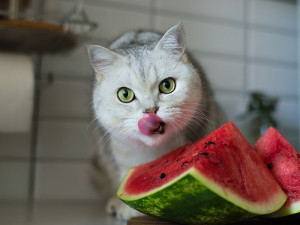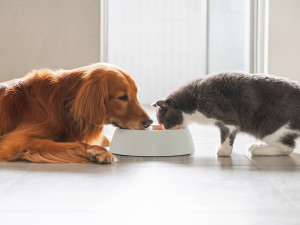Can Cats Eat Sweet Potatoes?
Yep—but the plainer, the better. Here’s why.
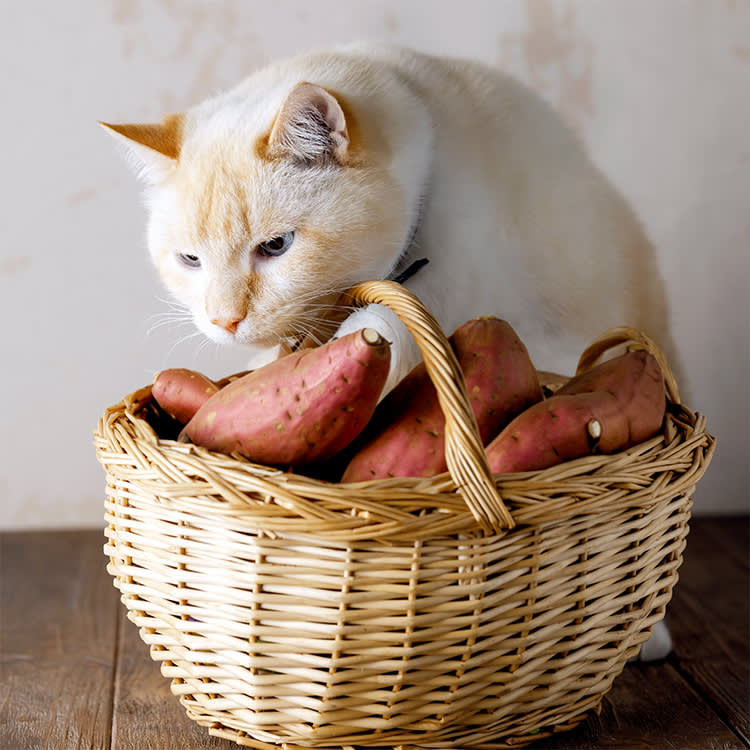
share article
In some delicious form or another, sweet potatoes are a staple dish when they’re in season. So, can your cat snack on sweet potatoes, too? Yes, plain sweet potatoes are perfectly safe for your cat in moderation — with a strong emphasis on the plain. Sweet potatoes prepared with certain spices, butters or sugars are best saved for human dinner guests — not cats. For more, we reached out to veterinarian Dr. Lindsay Butzeropens in a new tab to tell us how to safely treat our cats to sweet potatoes.
Are sweet potatoes good for cats?
Yes, sweet potatoes in moderation can have health benefits for your kitty. “Sweet potatoes contain vitamins and minerals, like vitamin A, vitamin C, and potassium, that can be beneficial for your cat’s overall health,” Dr. Butzer tells The Wildest.
Keep in mind, cats are primarily carnivores and get most of their nutrition from an animal protein-based diet. That said, sweet potatoes should only be given as an occasional treat and in moderation. Among other things, too much fibrous sweet potato can cause your cat to fill up when they need to be eating their normal food that provides them with their most necessary nutrients.
Can cats eat cooked sweet potatoes?
Yes, cats can eat cooked sweet potatoes — under certain conditions. “Cats can eat sweet potatoes, but in moderation and only if cooked and mashed,” Dr. Butzer advises.
Cooked, mashed sweet potatoes should also be served completely plain — without the regular salts, spices, and fats that make them tasty to people.
Can cats eat raw sweet potatoes?
No, cats should not eat raw sweet potatoes. In addition to causing GI and digestive upsetopens in a new tab, raw sweet potato is tough and hard for your cat to chew, making it a choking hazard. Don’t panic if your cat successfully snags a few bites of the dropped veggie; raw sweet potato doesn’t contain any specific toxins that could harm your cat.
Can cats eat sweet potato skins?
No, cats should not eat sweet potato skins. Sweet potato skins are especially fibrous and might be hard for your cat to digest. This can lead to nauseaopens in a new tab, GI upset, and diarrhea in your catopens in a new tab. If you choose to feed your cat plain cooked sweet potato, ensure that you remove the skins before serving.
Can cats eat sweet potato fries?
No, cats should not eat sweet potato fries. Sweet potato fries are often seasoned with salts and oils, both of which are bad for your cat’s health, along with other spices that can be toxic to cats. In addition, many sweet potato fries are served with the skin on, which is a very fibrous part of the veggie that can cause GI upset in your cat. Sweet potato fries are also generally very long and can present as a choking hazard for your cat. If you choose to serve cooked sweet potatoes to your cat, ensure that they are mashed and served plain.
Can cats eat canned sweet potatoes?
Yes, cats can eat canned sweet potatoes as long as they are store bought and don’t contain other additives. Some canned sweet potatoes are preserved with syrups that contain sugar and preservatives that are not safe for cats. In addition, home-canned sweet potatoes are susceptible to bacteria and molds that are not always visible and can be toxic to your cat.
Are sweet potatoes completely safe for cats?
Sweet potatoes do not contain any toxins that are harmful to your cat. However, sweet potatoes served with fats, oils, sugars, or spices (aka the delicious ones) are not safe for your cat and should not be given as a treat. Only plain, mashed, and cooked sweet potato is feline-safe — and only when served in moderation.
“Feeding your cat too much sweet potato can lead to obesityopens in a new tab and other health issues, as they are high in carbohydrates,” Dr. Butzer reminds cat parents. “Cats should primarily consume a diet rich in animal proteins, so it’s important not to overdo it with sweet potatoes or other plant-based foods.”
What are other cat-safe foods?
Cooked, plain, lean meats: Cats are carnivorous, so they get most of their nutrients from meat. But cats should avoid fatty meats and anything prepared with fats, oils, or spices. That said, if you’re serving up plain cooked chicken breast, feel free to share some with your cat.
Apples: Cats can enjoy skinless apples in small quantities — however, without any sweet receptorsopens in a new tab, cats might not enjoy it the same way we do. Still, just because they can’t taste the sugar doesn’t mean they won’t be affected by it, so don’t treat cats with diabetesopens in a new tab or other health issues to apples. For more info on cats and apples check out our guide here. opens in a new tab
Peas: Peas are a common additive in cat food and are completely safe for your cat in its regular, cooked form. We know we’ve said it a million times, but make sure not to feed your cat peas that have been salted or seasoned. Always supervise your cat when eating peas because bigger ones can be a choking hazard.
What are other non-cat safe foods?
Grapes and raisins: Grapes and raisins are very toxicopens in a new tab to cats and should never be given to them under any circumstances. Store all grapes and raisins securely out of a cat’s reach, ideally in cabinets or fridges. If you suspect or observe your cat eating grapes or raisins, contact your vet immediately.
Garlic and onions: Both cats and dogs are susceptible to the toxins present in garlic and onions. That’s why we stress never giving pets foods that have been prepared with seasonings — as garlic and onion are common base seasonings for many foods.
Citrus fruits: Citrus fruits contain potent essential oils that are highly toxic to catsopens in a new tab. These oils are unique in that they can be poisonous when ingested and through skin/fur contact. The degree of toxicity varies based on amount of exposure, so the less contact the better.
Bottom line: Can cats eat human food?
Most of the time, human food is best reserved for, well, humans — especially foods prepared with spices and sauces. On its own and in moderation, sweet potatoes are a non-toxic, delicious snack for cats. If your cat has stomach sensitivities or dietary restrictions, however, make sure to speak with your vet before introducing any new foods to your pet.
In the grand scheme of things, human food should never make up more than 10 percent of your cat’s diet and is best reserved for a special occasion. If you do want to treat your cat to a delicious and nutritious snack, plain sweet potatoes are a great option.
FAQ (people also ask):
Are sweet potatoes toxic to cats?
No, sweet potatoes are not toxic to your cat; however, they should only be given to your cat when cooked and mashed and always served plain.
Are sweet potatoes good for cats?
Sweet potatoes contain vitamins and minerals that can be beneficial to cats. Cats get most of their nutrition from an animal protein based diet, though, so sweet potatoes should never be integrated as a main vehicle for nutrition.
Why do cats like sweet potatoes?
Cats don’t have sweet receptors, so their interest in the veggie might be around the secondary tastes and aromas. They might also enjoy the texture and warmth.
References:

Rebecca Caplan
Rebecca Caplan is a writer based in Brooklyn whose work has been featured in The New Yorker, Reductress, and Vulture. She lives in Brooklyn with her perfect, toothless dog Moose.
Related articles
![A Birma Kat Smells Fresh Fish On A Board Ready To Be Cooked.]() opens in a new tab
opens in a new tabCan Cats Eat Tuna?
It’s a classic kitty snack, but don’t go overboard.
![Dark grey cat eating two slices of break laid on top of a wooden railing of an outdoor deck]() opens in a new tab
opens in a new tabCan Cats Eat Bread?
Go ahead and give your carb-loving cat a few bites, but don’t hand over the bread basket.
![A cat eating wet food from a dish in the kitchen.]() opens in a new tab
opens in a new tab10 Cat Meal Toppers for Finicky Eaters
Tips for improving your cat’s appetite with these tasty add-ons.
![Siamese cat coughing]() opens in a new tab
opens in a new tabWhy Is My Cat Coughing?
You thought it was a hairball, but nothing’s coming up…
![White kitten with tongue out next to slices of watermelon]() opens in a new tab
opens in a new tabCan My Cat Safely Enjoy Watermelon? A Guide to Feline Dietary Choices
Yes, the summertime staple is on the list of “safe” foods for cats.
![A dog and a cat eating from the same food dish.]() opens in a new tab
opens in a new tabHelp Your Chonky Pet Lose Weight
This National Pet Obesity Awareness Day, here are pro tips to help make sure your pet isn’t packing on too many pounds.

